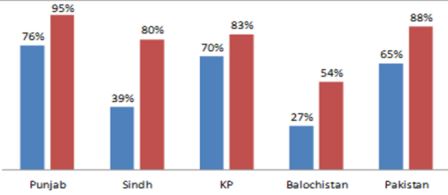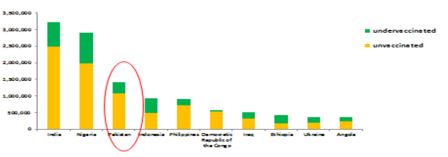The Expanded Programme on Immunization (EPI) was launched in Pakistan in 1978 to protect children by immunizing them against childhood tuberculosis, poliomyelitis, diphtheria, pertussis, tetanus and measles. Later, with the support of development partners, a number of new vaccines e.g. hepatitis B, haemophilus influenzae type b (Hib) and pneumococcal vaccine (PCV10) were introduced in 2002, 2009 and 2012, and inactivated polio vaccine in 2015, respectively.
It also aims to protect mothers and newborn against tetanus. Immunizing children with these vaccines may avert up to 17% of childhood mortality in Pakistan and thus help contribute towards achieving Sustainable Development Goal (SDG) 3, on reducing child morbidity and mortality. The programme also plans to introduce rotavirus vaccine in 2017, which will prevent one cause of fatal diarrhoea due to rotavirus (Table 1).
Table 1. Pakistan's EPI vaccination schedule
|
Disease |
Causative agent |
Vaccine |
Doses |
Age of administration |
|
Childhood TB |
Bacteria |
BCG |
1 |
Soon after birth |
|
Poliomyelitis |
Virus |
OPV |
4 |
OPV0: soon after birth OPV1: 6 weeks OPV2: 10 weeks OPV3: 14 weeks |
|
IPV |
1 |
IPV-I: 14 weeks |
||
|
Diphtheria |
Bacteria |
Pentavalent vaccine (DTP+Hep B + Hib) |
3 |
Penta1: 6 weeks Penta2: 10 weeks Penta3: 14 weeks |
|
Tetanus |
Bacteria |
|||
|
Pertussis |
Bacteria |
|||
|
Hepatitis B |
Virus |
|||
|
Hib pneumonia and meningitis |
Bacteria |
|||
|
Measles |
Virus |
Measles |
2 |
Measles1: 9 months Measles2: 15months |
|
Diarrhoea due to rotavirus |
Virus |
*Rotavirus |
2 |
Rota 1: 6 weeks Rota 2: 10 weeks |
The national immunization programme has contributed tosignificantly decreasing childhood morbidity and mortality due to vaccine preventable diseases. A child needs only 5 visits during the first year and one visit during the second year of his/her life to complete the vaccination with 6 visits against 9 dreadful diseases.
Programme objectives
The objectives of the EPI are to:
- affirm the commitment of the Government of Pakistan to provide safe, effective and cost-effective vaccination against vaccine preventable diseases;
- set national standards and guidelines for immunization aligned with the global goals and evidence base, and encourage the generation of local evidence for vaccination against vaccine preventable diseases.
The Pakistan EPI programme has adopted its goals and strategies in accordance with priorities set at the global and regional level. The National Immunization Technical Advisory Group (NITAG), was established in 2008, by the Ministry of Health in accordance with WHO guidelines. A programme policy/guideline document was developed in 2015 with the support of partners. The document lays out policy direction and guidelines for involvement of lady health workers in immunization service delivery, and in the area of the private sector’s role in immunization.
The new immunization policy envisages Pakistan’s Vision 2025 by addressing its key goal - to reduce infant mortality rate from 74 to less than 40 (per 1000 births) and reduce maternal mortality rate from 276 to less than 140 (per 1000 births) and continue reducing the infant mortality rate through immunization targets and activities in order to achieve SDG 3 for the country.
Current situation
Despite significant efforts by the Government and its partners, Pakistan’s immunization indicators have yet to reach the expected benchmarks. The key goals of polio eradication, and measles, have not been achieved. However Punjab is the first province to achieve elimination of maternal and neonatal tetanus in 2016.The current EPI coverage for fully immunized based on PDHS (2012–2013) and PSLM (2014–2015) surveys is 65% and 88%, respectively.

Fig. 1. DTP3 coverage in provinces of Pakistan
Pakistan is third among countries with the most unvaccinated and under-vaccinated children. Of the 3.8 million infants who did not receive their third dose of DTP3 vaccine in the Region in 2015, 40% of those were in Pakistan.

Figure 2. The 10 countries wth the most under- and un-vaccinated children (based on coverage with the first and third doses of DTP-containing vaccine), 2015

Figure 3. 3.8 million infants have not received their third dose of DTP vaccine in the Region; 97% of these children are in conflict-affected countries
For strengthening the EPI services WHO supported the development of comprehensive multiyear plan (cMYPs) for federal and provincial EPI programmes and based on it the PC-1s and annual plan of action are developed. Capacity- building is ongoing from mid-level managers to field staff, including vaccinators and lady health workers. Effective vaccine management is also supported by the partners. Steps are being taken to improve the data quality by periodic data quality assessments and programme review.









